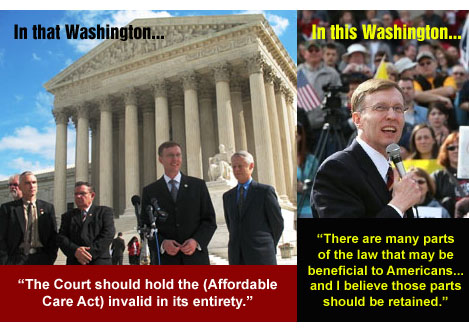OPINION
Rob McKenna’s hardline stance on Medicaid would cost state
In an Oct. 2 debate in Yakima, Attorney General Rob McKenna compounded the perception he’s a sore loser over his lawsuit challenging federal health care reform.
In upholding the Affordable Care Act, Chief Justice John Roberts’ opinion found states could opt in, or out, of Medicaid expansion to cover those uninsured who fall below the eligibility threshold for purchasing insurance through state-run health benefits exchanges.
The Medicaid expansion would be a great deal for states opting in: The federal government would pay all costs for the first three years, with the proportion gradually dropping to 90% by 2020.
In contrast, the federal government only matches half of Washington’s existing Medicaid costs.
To date, the ranks of those who would reject this federal assistance have included hard-line Southern Republican governors like Texas Gov. Rick Perry and South Carolina Gov. Nikki Haley. Yet McKenna claims he, too, would reject it — even though former Republican Utah Gov. Mike Leavitt (an advisor to Mitt Romney), in a report prepared for Idaho, thinks most states would sign up if the program remains intact.
In Yakima, McKenna made the extraordinary claim, that Medicaid expansion would compete with private insurance. He stated, “The goal is to keep them on private insurance as much as possible.”
Really?
Let’s examine that claim: In Washington’s individual insurance market today, for example, there are perhaps only 30,000 who would be eligible for Medicaid expansion — compared to an uninsured population of over one million, of whom a projected 328,000 would enroll in Medicaid.
Further, the tiny fraction of poor Washingtonians who currently have private insurance possess weak coverage — it really only protects them in catastrophic circumstances.
Under federal health care reform, insurance plans will be rated by actuarial value — with metal levels indicating value. In other words, a Bronze plan would have a 60% actuarial value, while you pay the other 40% of health care costs through deductibles or co-pays. As is true today, higher quality insurance would mean less cost-sharing. Thus, a Silver plan would pay 70% of costs, Gold 80%, and Platinum 90%.
By this metal standard, those with private insurance today who would be eligible for Medicaid have what might be called “lead” or “tin” coverage. Because, by 2014, coverage must be meaningful enough to be at least Bronze, this low-value insurance might be unaffordable for those eligible for Medicaid. They could only afford it through federal subsidies, and the weight of their costs will raise rates for the rest of us with private insurance.
In other words, failing to shift this small population to Medicaid would cost the vast majority of Washingtonians with insurance more — and still cost the federal government.
State calculations are that not expanding Medicaid to this segment would increase individual market premiums by $50 annually, because poor Washingtonians buying insurance so often do so only out of medical necessity — at a cost 26% more than the rest of this market.
Thus, Rob McKenna’s refusal to expand Medicaid would “tax” everyone else buying insurance through the individual market.
Further, McKenna would damage hospitals that, as part of the federal health care reform bargain, agreed to lower government payments expecting Medicaid expansion to cover its share of the more than $1 billion in uncompensated care annually provided in Washington. This would have a disastrous ripple effect through medical practices, and particularly impact rural hospitals. Why deny them the federal government’s return of hundreds of millions of dollars from Washingtonians’ federal taxes?
These incontrovertible facts make McKenna’s latest health care position as incomprehensible as arguing to overturn an entire health care reform act that he said he mostly liked — praising guaranteed issue for children with pre-existing conditions and other consumer protections.
 In a July 6, 2010, press release, McKenna stated, “Despite what many have reported, this suit will not overturn or repeal the new health care reform legislation.”
In a July 6, 2010, press release, McKenna stated, “Despite what many have reported, this suit will not overturn or repeal the new health care reform legislation.”
Yet that’s exactly what his suit asked for, and what a U.S. district court judge had delivered in a ruling McKenna unconditionally celebrated with a Jan. 31, 2011, press release.
Denied his way, the facts suggest a pouting McKenna now wants to punish Washingtonians and their health care providers.
To paraphrase the political philosopher Marshall Mathers III, on health care reform, will the real Rob McKenna please stand up, please stand up, please stand up?
Brendan Williams is a former State Representative from the 22nd Legislative District.






